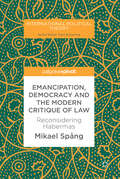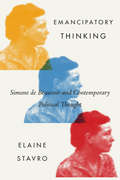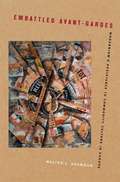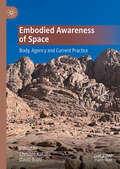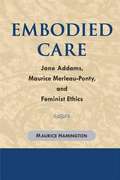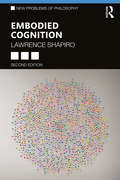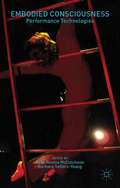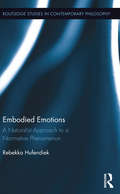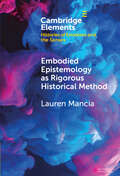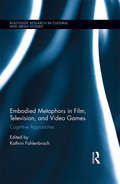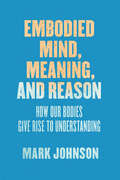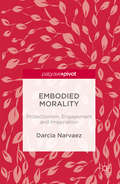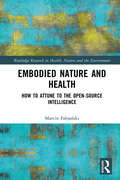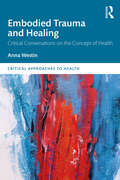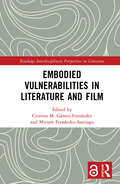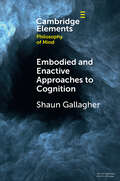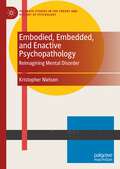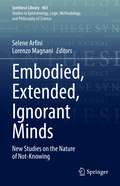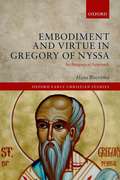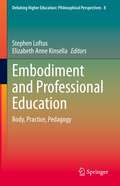- Table View
- List View
Emancipation, Democracy and the Modern Critique of Law: Reconsidering Habermas (International Political Theory)
by Mikael SpångThis book focuses on Jürgen Habermas’ theorising on law, rights and democracy in light of the modern critique of law. The latter tradition, which goes back to Hegel and Marx, has addressed the limitations of rights as vocabulary of emancipation and law as language of autonomy. Since Habermas claims that his reconstruction of private and public autonomy has an emancipatory aim, the author has chosen to discuss it in the context of the modern critique of law. More specifically, the study addresses the need to consider the dialectic of law, in which law is both a condition for emancipation and domination, when discussing what law and rights permit. It will appeal to students and scholars across the fields of political theory, law and legal criticism, as well as sociology and sociology of law.
Emancipatory Change in US Higher Education
by Zachary S. Ritter Kenneth R. Roth Felix Kumah-AbiwuThis edited volume explores and deconstructs the possibilities of higher education beyond its initial purpose. The book contextualizes and argues for a more robust interrogation of persistent patterns of campus inequality driven by rapid demographic change, reduced public spending in higher education, and an increasingly polarized political landscape. It offers contemporary views and critiques ideas and practices such as micro-aggressions, implicit and explicit bias, and their consequences in reifying racial and gender-based inequalities on members of nondominant groups. The book also highlights coping mechanisms and resistance strategies that have enabled members of nondominant groups to contest primarily racial- and gender- based inequity. In doing so, it identifies new ways higher education can do what it professes to do better, in all ways, from providing real benefit to students and communities, while also setting a bar for society to more effectively realize its stated purpose and creed.
Emancipatory Thinking: Simone de Beauvoir and Contemporary Political Thought (McGill-Queen's Studies in the History of Ideas #76)
by Elaine StavroMost scholars have focused on The Second Sex and Simone de Beauvoir’s fiction, concentrating on gender issues but ignoring her broader emancipatory vision. Though Beauvoir’s political thinking is not as closely studied as her feminist works, it underpinned her activism and helped her navigate the dilemmas raised by revolutionary thought in the postwar period. In Emancipatory Thinking Elaine Stavro brings together Beauvoir’s philosophy and her political interventions to produce complex ideas on emancipation. Drawing from a range of work, including novels, essays, autobiographical writings, and philosophic texts, Stavro explains that for Beauvoir freedom is a movement that requires both personal and collective transformation. Freedom is not guaranteed by world historical systems, material structures, wilful action, or discursive practices, but requires engaged subjects who are able to take creative risks as well as synchronize with existing forces to work towards collective change. Beauvoir, Stavro asserts, resisted the trend of anti-humanism that has dominated French thinking since the 1960s and also managed to avoid the pitfalls of voluntarism and individualism. In fact, Stavro argues, Beauvoir appreciated the impact of material, socio-economic, institutional forces, without forgoing the capacity to initiate. Applying Beauvoir’s existential insights and understanding of embodied and situated subjectivity to recent debates within gender, literary, sociological, cultural, and political studies, Emancipatory Thinking provides a lens to explore the current political and theoretical landscape.
Emanzipation und Gewalt: Feministische Rechtskritik mit Karl Marx, Jacques Derrida und Gilles Deleuze (Philosophie & Kritik. Neue Beiträge zur politischen Philosophie und Kritischen Theorie)
by Liza MattutatSoziale Bewegungen stehen seit jeher in einem ambivalenten Verhältnis zum Recht. Einerseits versuchen sie oft, ihre Ansprüche als Rechte geltend zu machen, andererseits kritisieren sie die entpolitisierenden, gewaltsamen und repressiven Aspekte des Rechts. Liza Mattutat fragt deshalb, ob Rechtspolitiken möglich sind, die nicht nur die Inhalte des Rechts, sondern zugleich seine Form verändern. Dazu rekonstruiert sie die rechtskritischen Argumente von Karl Marx, Jacques Derrida und Gilles Deleuze und deutet mit ihnen zeitgenössische Auseinandersetzungen um die Ehe für alle, die Reform des Sexualstrafrechts und die Elternschaft von trans* Personen. Wo sind philosophische Rechtskritiken für die feministische Rechtspolitik einschlägig? Wo steht das bürgerliche Recht emanzipatorischen Bewegungen entgegen?
Embattled Avant-Gardes: Modernism's Resistance to Commodity Culture in Europe
by Walter AdamsonThis book provides a bold new perspective on a movement that defined the cultural landscape of the early twentieth century. Walter L. Adamson embarks on a lucid, wide-ranging exploration of the avant-garde practices through which the modernist generations coming after 1900 resisted the rise of commodity culture as a threat to authentic cultural expression.
Embattled: How Ancient Greek Myths Empower Us to Resist Tyranny
by Emily Katz AnhaltAn incisive exploration of the way Greek myths empower us to defeat tyranny. As tyrannical passions increasingly plague twenty-first-century politics, tales told in ancient Greek epics and tragedies provide a vital antidote. Democracy as a concept did not exist until the Greeks coined the term and tried the experiment, but the idea can be traced to stories that the ancient Greeks told and retold. From the eighth through the fifth centuries BCE, Homeric epics and Athenian tragedies exposed the tyrannical potential of individuals and groups large and small. These stories identified abuses of power as self-defeating. They initiated and fostered a movement away from despotism and toward broader forms of political participation. Following her highly praised book Enraged: Why Violent Times Need Ancient Greek Myths, the classicist Emily Katz Anhalt retells tales from key ancient Greek texts and proceeds to interpret the important message they hold for us today. As she reveals, Homer's Iliad and Odyssey, Aeschylus's Oresteia, and Sophocles's Antigone encourage us—as they encouraged the ancient Greeks—to take responsibility for our own choices and their consequences. These stories emphasize the responsibilities that come with power (any power, whether derived from birth, wealth, personal talents, or numerical advantage), reminding us that the powerful and the powerless alike have obligations to each other. They assist us in restraining destructive passions and balancing tribal allegiances with civic responsibilities. They empower us to resist the tyrannical impulses not only of others but also in ourselves. In an era of political polarization, Embattled demonstrates that if we seek to eradicate tyranny in all its toxic forms, ancient Greek epics and tragedies can point the way.
Embezzlement and High Treason Louis XIV's France: The Trial of Nicolas Fouquet
by Vincent J. PittsA look at life in the court of King Louis XIV, the politics of the time, and the trial of a man who knew too much for his own good.From 1661 to 1664, France was mesmerized by the arrest and trial of Nicolas Fouquet, the country’s superintendent of finance. Prosecuted on trumped-up charges of embezzlement, mismanagement of funds, and high treason, Fouquet managed to exonerate himself from all the major charges over the course of three long years, in the process embarrassing and infuriating Louis XIV. The young king overturned the court’s decision and sentenced Fouquet to lifelong imprisonment in a remote fortress in the Alps.A dramatic critique of absolute monarchy in pre-revolutionary France, Embezzlement and High Treason in Louis XIV’s France tells the gripping tale of an overly ambitious man who rose rapidly in the state hierarchy—then overreached. Vincent J. Pitts uses the trial as a lens through which to explore the inner workings of the court of Louis XIV, who rightly feared that Fouquet would expose the tawdry financial dealings of the king’s late mentor and prime minister, Cardinal Mazarin.“A compelling account of a political drama in mid-seventeenth century France, but it is also a window into the process by which rule of law gradually became established . . . [and] I thoroughly enjoyed reading it.” —EH.Net“Pitts’s book examines the show trial of Fouquet, and…the political process that created such an unfair outcome for a man who is often seen as one of the most well-known scapegoats in French history. Pitts has succeeded masterfully in weaving a powerful narrative that exposes convoluted corruption and mismanagement of ancient régime France.” —Renaissance Quarterly
Embodied Awareness of Space: Body, Agency and Current Practice
by David Boyd Christos KakalisThis edited volume explores the notion of embodied experience through a diverse range of disciplines: architecture, music, literature, performance studies, philosophy, geopolitics. In doing so, it illuminates the need to redefine the role of the human body as one of the protagonists for raising awareness of space-time issues through processing, experimentation and application of histories and theories of embodied awareness of space. Critically revisiting these spatio-temporal dialogues, this book suggests a method of linking theory, history and practice: past, present and future. The authors reinstate the significance of history and theory in creative thinking, and test their applicability in a number of different areas: theoretical and buildable architectural projects, mapping and geography, representation, and performative arts. This volume will appeal to students and scholars from architecture, art, cultural studies, landscape studies, media studies, and other disciplines in the humanities and social sciences.
Embodied Care: Jane Addams, Maurice Merleau-Ponty, and Feminist Ethics
by Maurice HamingtonUntil now, ethicists have said little about the body, limiting their comments on it to remarks made in passing or, at best, devoting a chapter to the subject. Embodied Care is the first work to argue for the body's centrality to care ethics, doing so by analyzing our corporeality at the phenomenological level. It develops the idea that our bodies are central to our morality, paying particular attention to the ways we come to care for one another. Hamington's argues that human bodies are "built to care"; as a result, embodiment must be recognized as a central factor in moral consideration. He takes the reader on an exciting journey from modern care ethics to Merleau-Ponty's philosophy of the body and then to Jane Addams's social activism and philosophy. The ideas in Embodied Care do not lead to yet another competing theory of morality; rather, they progress through theory and case studies to suggest that no theory of morality can be complete without a full consideration of the body.
Embodied Cognition
by Lawrence ShapiroEmbodied cognition often challenges standard cognitive science. In this outstanding introduction, Lawrence Shapiro sets out the central themes and debates surrounding embodied cognition, explaining and assessing the work of many of the key figures in the field, including George Lakoff, Alva Noe, Andy Clark, and Arthur Glenberg. Beginning with an outline of the theoretical and methodological commitments of standard cognitive science, Shapiro then examines philosophical and empirical arguments surrounding the traditional perspective. He introduces topics such as dynamic systems theory, ecological psychology, robotics, and connectionism, before addressing core issues in philosophy of mind such as mental representation and extended cognition. Including helpful chapter summaries and annotated further reading at the end of each chapter, Embodied Cognition is essential reading for all students of philosophy of mind, psychology, and cognitive science. "
Embodied Cognition (New Problems of Philosophy)
by Lawrence ShapiroEmbodied cognition is a recent development in psychology that practitioners often present as a superseding standard cognitive science. In this outstanding introduction, Lawrence Shapiro sets out the central themes and debates surrounding embodied cognition, explaining and assessing the work of many of the key figures in the field, including Lawrence Barsalou, Daniel Casasanto, Andy Clark, Alva Noë, and Michael Spivey. Beginning with an outline of the theoretical and methodological commitments of standard cognitive science, Shapiro then examines philosophical and empirical arguments surrounding the traditional perspective, setting the stage for a detailed examination of the embodied alternative. He introduces topics such as dynamical systems theory, ecological psychology, robotics, and connectionism, before addressing core issues in philosophy of mind such as mental representation and extended cognition. This second edition has been updated and revised throughout and includes new chapters that both expand on earlier topics and that introduce new material on embodied concepts, preference formation, and emotion. Including helpful chapter summaries and annotated further reading at the end of each chapter, Embodied Cognition, Second Edition is essential reading for all students of philosophy of mind, psychology, and cognitive science.
Embodied Consciousness: Performance Technologies
by Barbara Sellers-Young Jade Rosina MccutcheonThis volume of essays combines research from neuroscience, conscious studies, methods of training performers, modes of creating a staged narrative, Asian aesthetics, and post-modern theories of performance in an examination of the relationship between consciousness and performance.
Embodied Emotions: A Naturalist Approach to a Normative Phenomenon (Routledge Studies in Contemporary Philosophy)
by Rebekka HufendiekIn this book, Rebekka Hufendiek explores emotions as embodied, action-oriented representations, providing a non-cognitivist theory of emotions that accounts for their normative dimensions. Embodied Emotions focuses not only on the bodily reactions involved in emotions, but also on the environment within which emotions are embedded and on the social character of this environment, its ontological constitution, and the way it scaffolds both the development of particular emotion types and the unfolding of individual emotional episodes. In addition, it provides a critical review and appraisal of current empirical studies, mainly in psychophysiology and developmental psychology, which are relevant to discussions about whether emotions are embodied as well as socially embedded. The theory that Hufendiek puts forward denies the distinction between basic and higher cognitive emotions: all emotions are embodied, action-oriented representations. This approach can account for the complex normative structure of emotions, and shares the advantages of cognitivist accounts of emotions without sharing their problems. Embodied Emotions makes an original contribution to ongoing debates on the normative aspects of emotions and will be of interest to philosophers working on emotions, embodied cognition and situated cognition, as well as neuroscientists or psychologists who study emotions and are interested in placing their own work within a broader theoretical framework.
Embodied Epistemology as Rigorous Historical Method (Elements in Histories of Emotions and the Senses)
by Lauren ManciaThis Element proposes that, in addition to using traditional historical methodologies, historians need to find extra-textual, embodied ways of understanding the past in order to more fully comprehend it. Written by a medieval historian, the Element explains why historians assume they cannot use reperformance in historical inquiry and why they, in fact, should. The Element employs tools from the discipline of performance studies, which has long grappled with the differences between the archive and the repertoire, between the records of historical performances and the embodied movements, memories, and emotions of the performance itself, which are often deemed unknowable by scholars. It shows how an embodied epistemology is particularly suited to studying certain premodern historical topics, using the example of medieval monasticism. Finally, using the case of performance-lectures given at The Met Cloisters, it shows how using performance as a tool for historical investigation might work.
Embodied Metaphors in Film, Television, and Video Games: Cognitive Approaches (Routledge Research in Cultural and Media Studies)
by Kathrin FahlenbrachIn cognitive research, metaphors have been shown to help us imagine complex, abstract, or invisible ideas, concepts, or emotions. Contributors to this book argue that metaphors occur not only in language, but in audio visual media well. This is all the more evident in entertainment media, which strategically "sell" their products by addressing their viewers’ immediate, reflexive understanding through pictures, sounds, and language. This volume applies cognitive metaphor theory (CMT) to film, television, and video games in order to analyze the embodied aesthetics and meanings of those moving images.
Embodied Mind, Meaning, and Reason: How Our Bodies Give Rise to Understanding
by Mark JohnsonMark Johnson is one of the great thinkers of our time on how the body shapes the mind. This book brings together a selection of essays from the past two decades that build a powerful argument that any scientifically and philosophically satisfactory view of mind and thought must ultimately explain how bodily perception and action give rise to cognition, meaning, language, action, and values. A brief account of Johnson’s own intellectual journey, through which we track some of the most important discoveries in the field over the past forty years, sets the stage. Subsequent chapters set out Johnson’s important role in embodied cognition theory, including his cofounding (with George Lakoff) of conceptual metaphor theory and, later, their theory of bodily structures and processes that underlie all meaning, conceptualization, and reasoning. A detailed account of how meaning arises from our physical engagement with our environments provides the basis for a nondualistic, nonreductive view of mind that he sees as most congruous with the latest cognitive science. A concluding section explores the implications of our embodiment for our understanding of knowledge, reason, and truth. The resulting book will be essential for all philosophers dealing with mind, thought, and language.
Embodied Morality
by Darcia NarvaezIn this book the broad, interdisciplinary theory of Triune Ethics Meta-theory is explored to demonstrate how it explains the different patterns of morality seen in the world today. It describes how human morality develops dynamically from experience in early life and it proposes that the methods in which humans are raised bring about tendencies towards self-protective or open-hearted social relations. When the life course follows evolutionary systems, then prosocial, open-hearted capacities develop but when the life course goes against evolutionary systems it should not be a surprise that self-focused values and behaviors develop such as violent tribalism, self aggrandizement and a binary orientation to others (dominance or submission). Many humans alive today exhibit impaired capacities in comparison to humans from small-band hunter-gatherer societies, the type of society that represents 99% of humanity's history. TEM is rooted in ethical naturalism and points out how to optimize human moral development through the lifespan--toward the ethics of engagement and communal imagination.
Embodied Nature and Health: How to Attune to the Open-source Intelligence (Routledge Research in Health, Nature and the Environment)
by Marcin FabjańskiThis book describes how, as a species our survival and capacity to flourish depends on realizing the intimate relationship of humans with nature through active, embodied participation with nature. Living within the physicality of the planet is not a limitation, rather it is our liberation. Full realization of the consequences of this relationship, through embodied action, can liberate us from ego-dependence and transform us into a community of interdependent and flourishing beings. Embodied Nature and Health: How to Attune to the Open-source Intelligence describes a systems analysis of presence-centered cultivation of well-being through particular ways of being physically and mentally active in relation to nature that aims at helping the individual attune to natures’ rhythms. The systems analysis proposes the hypothesis of the Open-source Intelligence: an intelligence which originates from the placement of individual organisms in the tissue and the process of life. This framework draws upon and integrates contemporary research into the human–nature relationship and human well-being, and ancient philosophies that were developed prior to the Cartesian gap between the mind and the body, as well as using an auto-ethnographic approach dervied from the experience of the author. The proposed system highlights a practical approach to well-being, based on research into human attention and its effective usage in daily life. The book outlines a methodology that can be used in schools, as a basis of training in sports, as well as in the field of self-development, and highlights the necessity to develop a new, non-abusive relationship with the natural environment. This novel, multi-discipline, first-of-its-kind research book will be of strong interest to experts and academics in the fields of physical activity, education, ecology, and philosophy.
Embodied Trauma and Healing: Critical Conversations on the Concept of Health (Critical Approaches to Health)
by Anna WestinWhat if philosophy could solve the psychological puzzle of trauma? Embodied Trauma and Healing argues just that, suggesting that one might be needed in order to understand the other. The book demonstrates how the body-mind problem that haunted Descartes was addressed by phenomenologists, whilst also proposing that the human experience is lived subjectively as embodied consciousness. Throughout this book, the author suggests that the phenomenological tools that are used to explore the body can also be an effective way to discuss the physical and mental aspects of embodied trauma. Drawing on the work of Paul Ricœur, Maurice Merleau-Ponty and Emmanuel Lévinas, the book outlines a phenomenological approach to the embodied and relational subject. It offers a reading of embodied trauma that can connect it to wider conversations in psychological underpinnings of trauma through Peter Levine’s somatic research and Bessel van der Kolk’s embodied remembering. Connecting to the analytic tradition, the book suggests that phenomenology can unify both language-based and body-based therapeutic practice. It also presents a compelling discussion that ties the embodied experience of relation in trauma to the wider causal factors of social suffering and relational rupture, intergenerational trauma and the trauma of land, as informed by phenomenology. Embodied Trauma and Healing is essential reading for researchers within the fields of philosophy, psychology and medical humanities for it actively engages with contemporary configurations of trauma theory and recent research developments in healing and mental disorder diagnosis.
Embodied VulnerAbilities in Literature and Film (Routledge Interdisciplinary Perspectives on Literature)
by Miriam Fernández-Santiago Gámez-Fernández, Cristina MEmbodied VulnerAbilities in Literature and Film includes a collection of essays exploring the ways in which recent literary and filmic representations of vulnerability depict embodied forms of vulnerability across languages, media, genres, countries, and traditions in the late 20th and early 21st centuries. The volume gathers 12 chapters penned by scholars from Japan, the USA, Canada, and Spain which look into the representation of vulnerability in human bodies and subjectivities. Not only is the array of genres covered in this volume significant— from narrative, drama, poetry, (auto)documentary, or film— in fiction and nonfiction, but also the varied cultural and linguistic coordinates of the literary and filmic texts scrutinized—from the USA, Canada, Spain, France, the Middle East, to Japan. Readers who decide to open the cover of this volume will benefit from becoming familiar with a relatively old topic— that of vulnerability— from a new perspective, so that they can consider the great potential of this critical concept anew.
Embodied and Enactive Approaches to Cognition (Elements in Philosophy of Mind)
by Shaun GallagherThis Element discusses contemporary theories of embodied cognition, including what has been termed the '4Es' (embodied, embedded, extended and enactive cognition). It examines diverse approaches to questions about the nature of the mind, the mind's relation to the brain, perceptual experience, mental representation, sense making, the role of the environment, and social cognition, and it considers the strengths and weaknesses of the theories in question. It contrasts embodied and enactive views with classic cognitivism, and discusses major criticisms and their possible resolutions. This element also provides a strong focus on enactive theory and the prospects for integrating enactive approaches with other embodied and extended theories, mediated through recent developments in predictive processing and the free energy principle. It concludes with a brief discussion of the practical applications of embodied cognition. This title is also available as Open Access on Cambridge Core.
Embodied, Embedded, and Enactive Psychopathology: Reimagining Mental Disorder (Palgrave Studies in the Theory and History of Psychology)
by Kristopher NielsenEmbodied, Embedded, and Enactive Psychopathology presents a new way of thinking about mental disorder that is holistic yet critically minded, biologically plausible yet value-inclusive, and scientific yet deeply compassionate. Grounded in an embodied, embedded, and enactive (3e) view of human functioning, this book presents a novel conceptual framework for the study and treatment of mental disorders and explores implications for the tasks of classification, explanation, and treatment. Chapters one to three argue for the central role of conceptualization in the study and treatment of mental disorders. Popular conceptual models are critiqued, including other recent enactive frameworks. Chapters four to seven then present 3e Psychopathology and explore its implications. This includes analysis of both research-based efforts to explain mental disorders, and methods for formulating individual-level explanations in clinical practice. New answers are presented for important questions such as: are mental disorders things we do or get? Are mental disorders defined in nature or are they socially constructed? Are mental disorders the same things across different cultures? And, are mental disorders located in our brains, bodies, or environments? This engaging work offers fresh insights that will appeal to clinicians, researchers, and those with an interest in the philosophy of psychiatry.
Embodied, Extended, Ignorant Minds: New Studies on the Nature of Not-Knowing (Synthese Library #463)
by Lorenzo Magnani Selene ArfiniThis book offers a new and externalist perspective in ignorance studies. Agnotology, the epistemology of ignorance, and, more generally, ignorance studies have grown to cover and explore different phenomena and subjects of research, from known events in history and sociology of science to the investigation of ordinary reasoning and cognitive processing. Nonetheless, although interested scholars have discussed ignorance phenomena and their impact on cognition, most of them have only adopted an internalist perspective to approach this theme. Meanwhile, even though externalist perspectives on cognition flourished in recent literature, authors have paid little attention to the emerging field of ignorance studies. Ignorance has been generally left out from the inquiries on the extension of cognitive states, cognitive processes, and predictive reasoning. Thus, in this volume, we seek to merge the two growing areas of research and to fill this research gap fruitfully. By addressing the uncomfortable themes that pertain to ignorance and related phenomena through an externalist perspective, this book aims to provide much food for thoughts to cognitive scientists and philosophers alike, enriching the current range and reach of both ignorance studies and externalist approaches to cognition.
Embodiment And Virtue In Gregory Of Nyssa: An Anagogical Approach (Oxford Early Christian Studies)
by Hans Boersma<P>Embodiment in the theology of Gregory of Nyssa is a much-debated topic. Hans Boersma argues that this - worldly realities of time and space, which include embodiment, are not the focus of Gregory's theology. Instead, embodiment plays a distinctly subordinate role. The key to his theology, Boersma suggests, is anagogy, going upward in order to participate in the life of God. <P>This book looks at a variety of topics connected to embodiment in Gregory's thought: time and space; allegory; gender, sexuality, and virginity; death and mourning; slavery, homelessness, and poverty; and the church as the body of Christ. In each instance, Boersma maintains, Gregory values embodiment only inasmuch as it enables us to go upward in the intellectual realm of the heavenly future. <P>Boersma suggests that for Gregory embodiment and virtue serve the anagogical pursuit of otherworldly realities. Countering recent trends in scholarship that highlight Gregory's appreciation of the goodness of creation, this book argues that Gregory looks at embodiment as a means for human beings to grow in virtue and so to participate in the divine life. <P>It is true that, as a Christian thinker, Gregory regards the creator-creature distinction as basic. But he also works with the distinction between spirit and matter. And Nyssen is convinced that in the hereafter the categories of time and space will disappear - while the human body will undergo an inconceivable transformation. This book, then, serves as a reminder of the profoundly otherworldly cast of Gregory's theology.
Embodiment and Professional Education: Body, Practice, Pedagogy (Debating Higher Education: Philosophical Perspectives #8)
by Stephen Loftus Elizabeth Anne KinsellaThis book draws attention to the ways in which an awareness of, and sensitivity to, embodiment can enlighten educational practices. It explores discourses from a range of thinkers, including Merleau-Ponty, Gadamer, Bakhtin, Haraway and Ahmed to name a few. The book argues that attention to embodiment can help us to reimagine the goals of education in ways that fit more coherently with human concerns and that offer the chance to provide education that is more holistic and grounded in our corporeality. Theories of embodiment can be used to modify education at the level of curriculum and at the level of pedagogy. This can help us design educational interventions that fit more naturally with how humans are inclined to learn and thus make educational experiences more meaningful. Attention to embodiment allows us to appreciate the extent to which the body appropriates a professional practice and the extent to which a professional practice appropriates the body of the learner. It shows how greater sensitivity to the body can enliven and enlighten our educational practices, especially in professional education.
